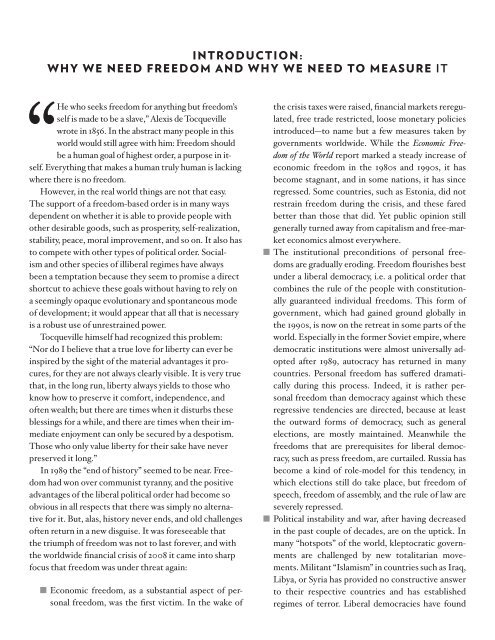P R E L I M I N A R Y R E P O R T
Rc8D1
Rc8D1
You also want an ePaper? Increase the reach of your titles
YUMPU automatically turns print PDFs into web optimized ePapers that Google loves.
INTRODUCTION:WHY WE NEED FREEDOM AND WHY WE NEED TO MEASURE IT“He who seeks freedom for anything but freedom’sself is made to be a slave,” Alexis de Tocquevillewrote in 1856. In the abstract many people in thisworld would still agree with him: Freedom shouldbe a human goal of highest order, a purpose in itself.Everything that makes a human truly human is lackingwhere there is no freedom.However, in the real world things are not that easy.The support of a freedom-based order is in many waysdependent on whether it is able to provide people withother desirable goods, such as prosperity, self-realization,stability, peace, moral improvement, and so on. It also hasto compete with other types of political order. Socialismand other species of illiberal regimes have alwaysbeen a temptation because they seem to promise a directshortcut to achieve these goals without having to rely ona seemingly opaque evolutionary and spontaneous modeof development; it would appear that all that is necessaryis a robust use of unrestrained power.Tocqueville himself had recognized this problem:“Nor do I believe that a true love for liberty can ever beinspired by the sight of the material advantages it procures,for they are not always clearly visible. It is very truethat, in the long run, liberty always yields to those whoknow how to preserve it comfort, independence, andoften wealth; but there are times when it disturbs theseblessings for a while, and there are times when their immediateenjoyment can only be secured by a despotism.Those who only value liberty for their sake have neverpreserved it long.”In 1989 the “end of history” seemed to be near. Freedomhad won over communist tyranny, and the positiveadvantages of the liberal political order had become soobvious in all respects that there was simply no alternativefor it. But, alas, history never ends, and old challengesoften return in a new disguise. It was foreseeable thatthe triumph of freedom was not to last forever, and withthe worldwide financial crisis of 2008 it came into sharpfocus that freedom was under threat again:■■Economic freedom, as a substantial aspect of personalfreedom, was the first victim. In the wake ofthe crisis taxes were raised, financial markets reregulated,free trade restricted, loose monetary policiesintroduced—to name but a few measures taken bygovernments worldwide. While the Economic Freedomof the World report marked a steady increase ofeconomic freedom in the 1980s and 1990s, it hasbecome stagnant, and in some nations, it has sinceregressed. Some countries, such as Estonia, did notrestrain freedom during the crisis, and these faredbetter than those that did. Yet public opinion stillgenerally turned away from capitalism and free-marketeconomics almost everywhere.■■The institutional preconditions of personal freedomsare gradually eroding. Freedom flourishes bestunder a liberal democracy, i.e. a political order thatcombines the rule of the people with constitutionallyguaranteed individual freedoms. This form ofgovernment, which had gained ground globally inthe 1990s, is now on the retreat in some parts of theworld. Especially in the former Soviet empire, wheredemocratic institutions were almost universally adoptedafter 1989, autocracy has returned in manycountries. Personal freedom has suffered dramaticallyduring this process. Indeed, it is rather personalfreedom than democracy against which theseregressive tendencies are directed, because at leastthe outward forms of democracy, such as generalelections, are mostly maintained. Meanwhile thefreedoms that are prerequisites for liberal democracy,such as press freedom, are curtailed. Russia hasbecome a kind of role-model for this tendency, inwhich elections still do take place, but freedom ofspeech, freedom of assembly, and the rule of law areseverely repressed.■■Political instability and war, after having decreasedin the past couple of decades, are on the uptick. Inmany “hotspots” of the world, kleptocratic governmentsare challenged by new totalitarian movements.Militant “Islamism” in countries such as Iraq,Libya, or Syria has provided no constructive answerto their respective countries and has establishedregimes of terror. Liberal democracies have found


